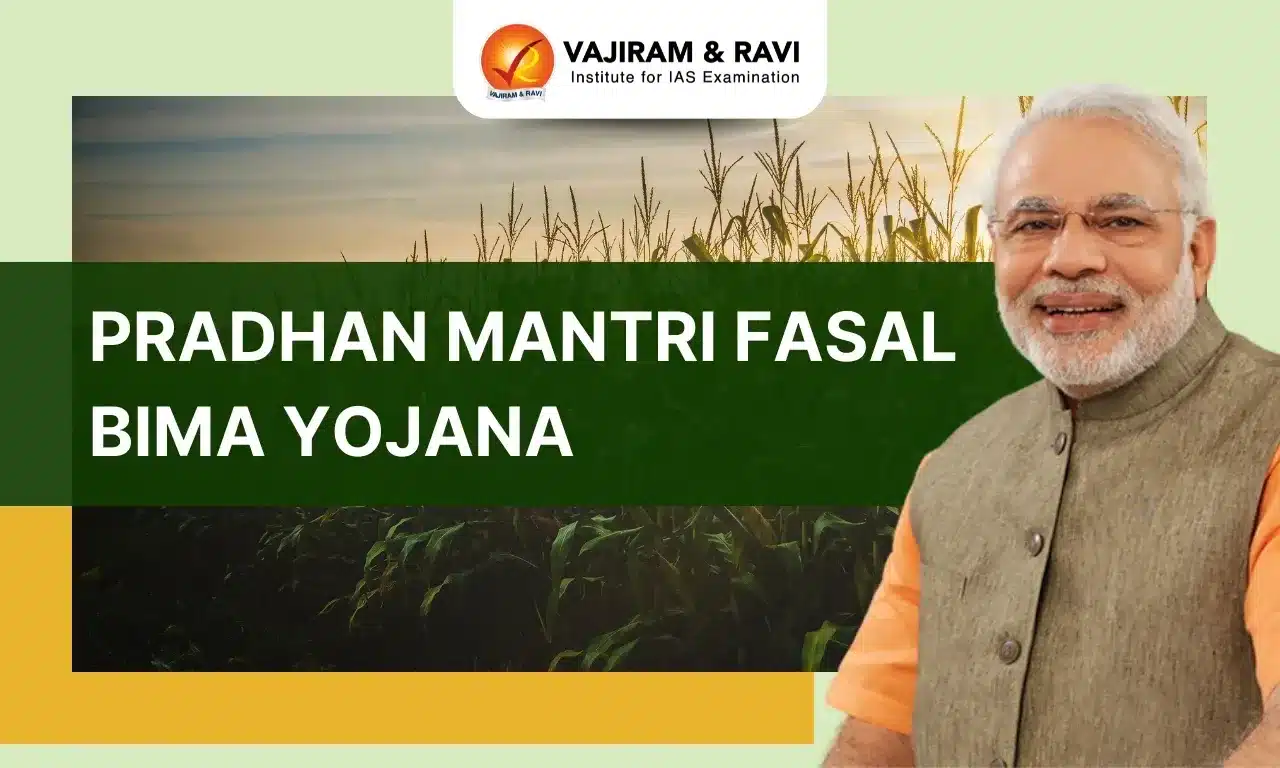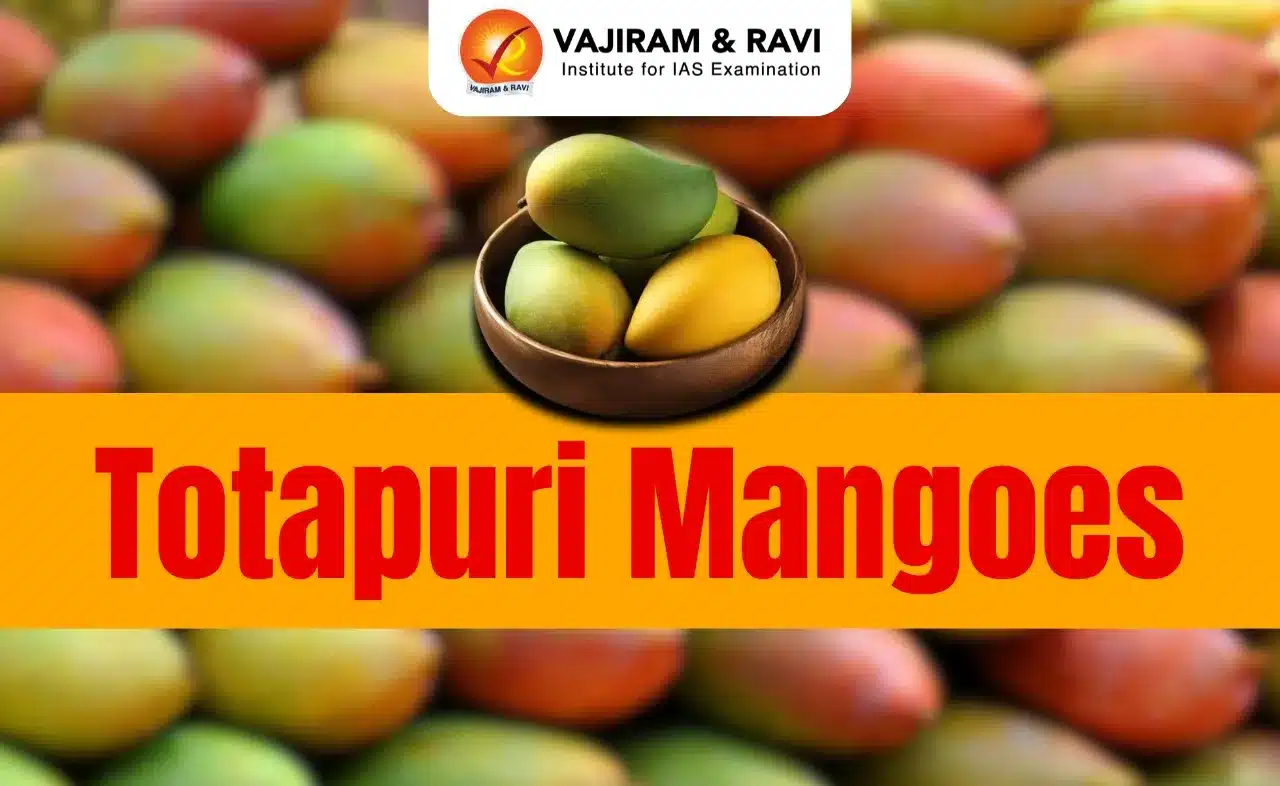Pradhan Mantri Fasal Bima Yojana Latest News
The Union government has decided to expand the ambit of the PM Fasal Bima Yojana to include crop damage by animals as a ground for payouts, a long-standing demand by farmers, an official said recently.
About Pradhan Mantri Fasal Bima Yojana
- Launched on 18th February 2016, PMFBY is a crop insurance scheme by the Department of Agriculture, Cooperation, and Farmers’ Welfare, Ministry of Agriculture.
- PMFBY aims to provide financial protection to farmers against crop loss due to natural disasters (hail, drought, famine), pests, and diseases.
- PMFBY provides crop insurance at a cost-effective premium to all Indian farmers.
- It is implemented through a network of insurance companies and banks.
Pradhan Mantri Fasal Bima Yojana Objectives
- To provide financial assistance and support to farmers suffering from crop damage or loss arising out of unforeseen events.
- To stabilise the income of farmers and ensure continuance in farming.
- To encourage the farmers to adopt modern and innovative agricultural practices.
- To ensure crop diversification, and creditworthiness of the farmers, enhance growth, and competitiveness of the agriculture sector and protect the farmers from production risks.
Pradhan Mantri Fasal Bima Yojana Eligibility
- All farmers, including sharecroppers and tenant farmers, growing the notified crops in the notified areas are eligible for coverage.
- Compulsory Component:All farmers availing Seasonal Agricultural Operations (SAO) loans from Financial Institutions (i.e. loanee farmers) for the notified crops would be covered compulsorily.
- Voluntary Component: The Scheme would be optional for the non-loanee farmers.
- Farmers must have an insurable interest in the insured crops.
- Farmers must possess a valid and authenticated land ownership certificate or a valid land tenure agreement.
- Farmers must not have received compensation for the same crop loss from any other medium or source.
- Special efforts shall be made to ensure maximum coverage of SC/ST/Women farmers under the scheme.
- Budget allocation and utilization under this should be in proportion to land holdings of SC/ ST/ General along with women in the respective state cluster.
Pradhan Mantri Fasal Bima Yojana Benefits
- Affordable Premiums:
- The maximum premium payable by the farmer will be 2% for the Kharif food and oilseed crops.
- For rabi food and oilseed crops, it is 1.5% and for yearly commercial or horticultural crops it will be 5%.
- The remaining premium is subsidized by the government.
- For the farmers in the North-Eastern States, Jammu, Kashmir, and Himachal Pradesh, the government also pays the entire premium.
- Comprehensive Coverage:
- The scheme covers natural disasters (droughts, floods), pests, and diseases.
- Post-harvest losses due to local risks like hailstorms and landslides are also included.
- Loss or damage to notified insured crops due to war, nuclear risks, malicious damage and other preventable risks is excluded from the scope of coverage.
- Timely Compensation: PMFBY aims to process claims within two months of the harvest to ensure that farmers get the compensation quickly, preventing them from falling into debt traps.
- Technology-Driven Implementation:
- PMFBY integrates advanced technologies like satellite imaging, drones, and mobile apps for precise estimation of crop loss, ensuring accurate claim settlements.
- The National Crop Insurance Portal (NCIP) digitizes processes for seamless farmer-insurer-bank interaction. YES-TECH (Yield Estimation System Based on Technology) ensures remote sensing based accurate yield estimation, while CROPIC (Collection of Real-time photos and Observations of Crops) uses geotagged photos to verify crops for precise damage assessment.
Pradhan Mantri Fasal Bima Yojana FAQs
Q1. Who are called sharecroppers?
Ans. A sharecropper is a tenant farmer, someone who works land that’s rented from its owner
Q2. What are Rabi Crops?
Ans: Rabi crops are cultivated during the spring season, which typically lasts from November to April in India.
Q3. What are Kharif crops?
Ans: Rabi crops are winter crops sown after the monsoon and harvested in spring, thriving in cool, dry conditions.
Q4. What is remote sensing?
Ans: Remote sensing is the science of obtaining information about objects or areas from a distance, typically from aircraft or satellites.
Source: HT
Last updated on June, 2025
→ UPSC Notification 2025 was released on 22nd January 2025.
→ UPSC Prelims Result 2025 is out now for the CSE held on 25 May 2025.
→ UPSC Prelims Question Paper 2025 and Unofficial Prelims Answer Key 2025 are available now.
→ UPSC Calendar 2026 is released on 15th May, 2025.
→ The UPSC Vacancy 2025 were released 1129, out of which 979 were for UPSC CSE and remaining 150 are for UPSC IFoS.
→ UPSC Mains 2025 will be conducted on 22nd August 2025.
→ UPSC Prelims 2026 will be conducted on 24th May, 2026 & UPSC Mains 2026 will be conducted on 21st August 2026.
→ The UPSC Selection Process is of 3 stages-Prelims, Mains and Interview.
→ UPSC Result 2024 is released with latest UPSC Marksheet 2024. Check Now!
→ UPSC Toppers List 2024 is released now. Shakti Dubey is UPSC AIR 1 2024 Topper.
→ Also check Best IAS Coaching in Delhi






















